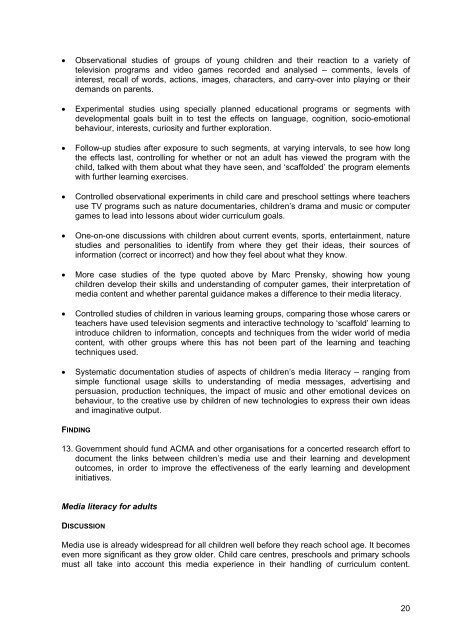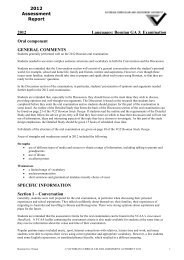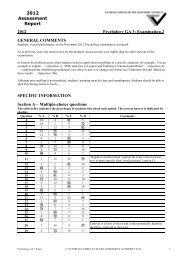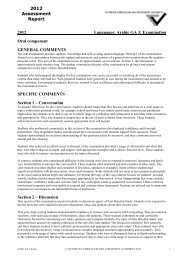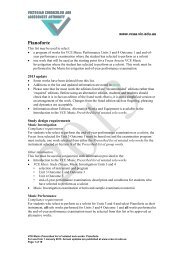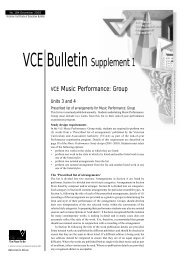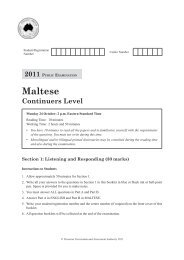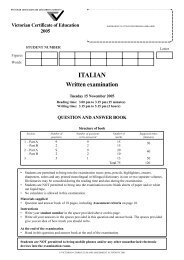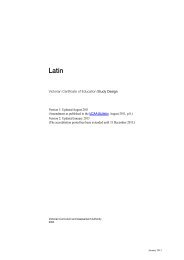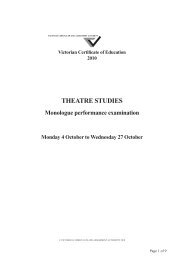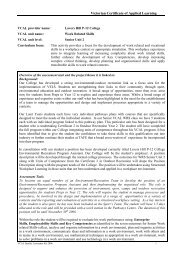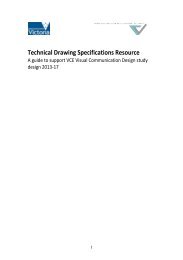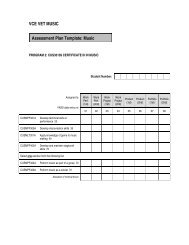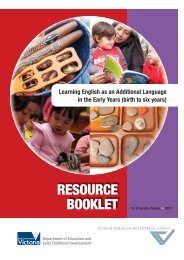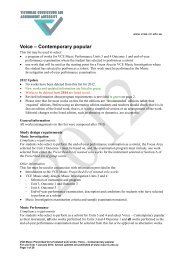television, digital media and children's learning - Victorian ...
television, digital media and children's learning - Victorian ...
television, digital media and children's learning - Victorian ...
Create successful ePaper yourself
Turn your PDF publications into a flip-book with our unique Google optimized e-Paper software.
• Observational studies of groups of young children <strong>and</strong> their reaction to a variety of<br />
<strong>television</strong> programs <strong>and</strong> video games recorded <strong>and</strong> analysed – comments, levels of<br />
interest, recall of words, actions, images, characters, <strong>and</strong> carry-over into playing or their<br />
dem<strong>and</strong>s on parents.<br />
• Experimental studies using specially planned educational programs or segments with<br />
developmental goals built in to test the effects on language, cognition, socio-emotional<br />
behaviour, interests, curiosity <strong>and</strong> further exploration.<br />
• Follow-up studies after exposure to such segments, at varying intervals, to see how long<br />
the effects last, controlling for whether or not an adult has viewed the program with the<br />
child, talked with them about what they have seen, <strong>and</strong> ‘scaffolded’ the program elements<br />
with further <strong>learning</strong> exercises.<br />
• Controlled observational experiments in child care <strong>and</strong> preschool settings where teachers<br />
use TV programs such as nature documentaries, children’s drama <strong>and</strong> music or computer<br />
games to lead into lessons about wider curriculum goals.<br />
• One-on-one discussions with children about current events, sports, entertainment, nature<br />
studies <strong>and</strong> personalities to identify from where they get their ideas, their sources of<br />
information (correct or incorrect) <strong>and</strong> how they feel about what they know.<br />
• More case studies of the type quoted above by Marc Prensky, showing how young<br />
children develop their skills <strong>and</strong> underst<strong>and</strong>ing of computer games, their interpretation of<br />
<strong>media</strong> content <strong>and</strong> whether parental guidance makes a difference to their <strong>media</strong> literacy.<br />
• Controlled studies of children in various <strong>learning</strong> groups, comparing those whose carers or<br />
teachers have used <strong>television</strong> segments <strong>and</strong> interactive technology to ‘scaffold’ <strong>learning</strong> to<br />
introduce children to information, concepts <strong>and</strong> techniques from the wider world of <strong>media</strong><br />
content, with other groups where this has not been part of the <strong>learning</strong> <strong>and</strong> teaching<br />
techniques used.<br />
• Systematic documentation studies of aspects of children’s <strong>media</strong> literacy – ranging from<br />
simple functional usage skills to underst<strong>and</strong>ing of <strong>media</strong> messages, advertising <strong>and</strong><br />
persuasion, production techniques, the impact of music <strong>and</strong> other emotional devices on<br />
behaviour, to the creative use by children of new technologies to express their own ideas<br />
<strong>and</strong> imaginative output.<br />
FINDING<br />
13. Government should fund ACMA <strong>and</strong> other organisations for a concerted research effort to<br />
document the links between children’s <strong>media</strong> use <strong>and</strong> their <strong>learning</strong> <strong>and</strong> development<br />
outcomes, in order to improve the effectiveness of the early <strong>learning</strong> <strong>and</strong> development<br />
initiatives.<br />
Media literacy for adults<br />
DISCUSSION<br />
Media use is already widespread for all children well before they reach school age. It becomes<br />
even more significant as they grow older. Child care centres, preschools <strong>and</strong> primary schools<br />
must all take into account this <strong>media</strong> experience in their h<strong>and</strong>ling of curriculum content.<br />
20


